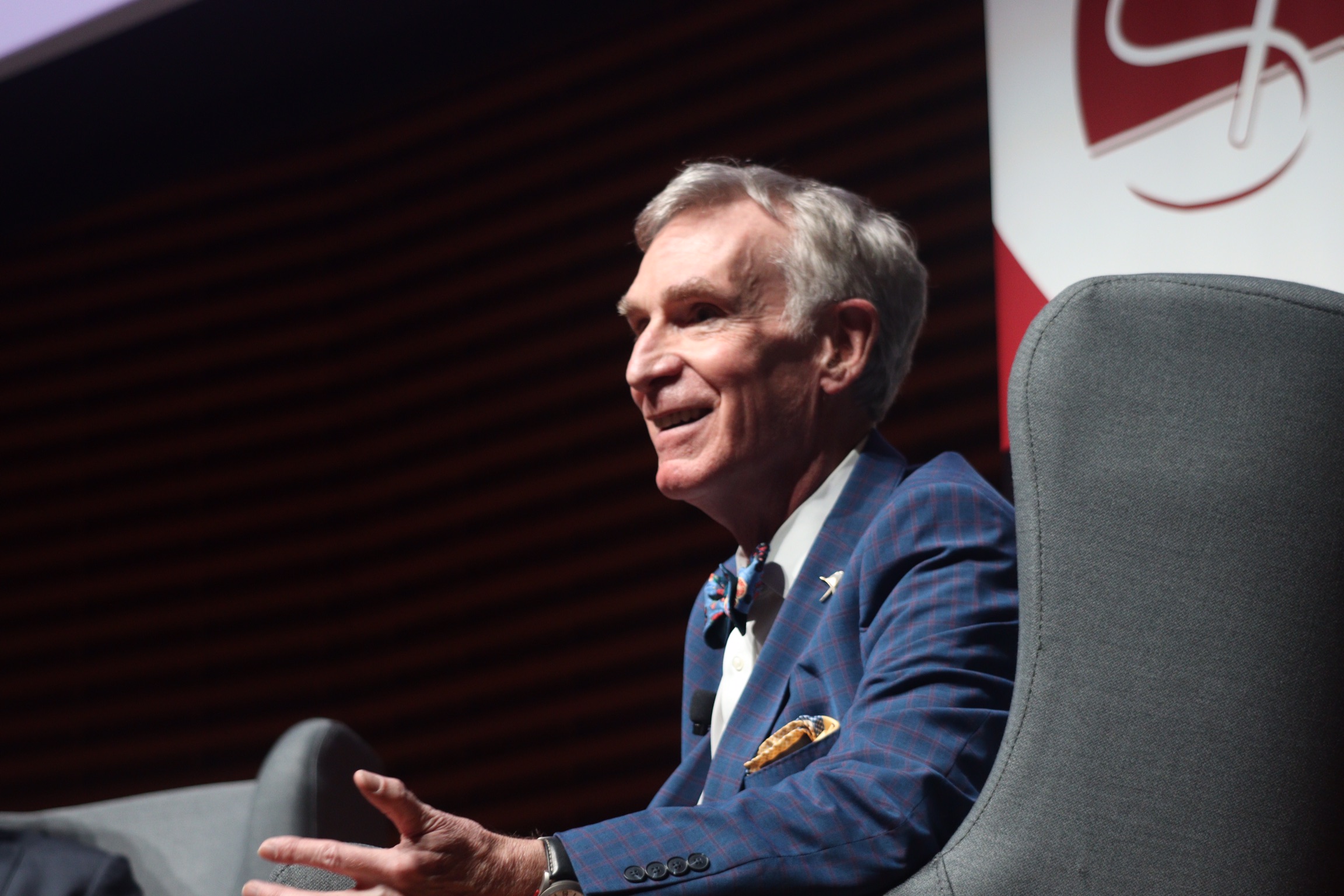Bill Nye, the science educator known by many for his PBS show “Bill Nye the Science Guy,” encouraged a packed crowd at CEMEX Auditorium to follow their curiosity and “change the world” on Friday evening.
Nye emerged on stage to shouts of “Bill! Bill!”, a reference to the theme song of his children’s show, as he joined moderator and Vice Chair of Education in the Department of Emergency Medicine Michael Gisondi for an hourlong Q&A. In an evening underscored by messages about the challenges and importance of science communication, Nye cracked jokes about technology and shared anecdotes about his mishaps as an up-and-coming stand-up comedian.
In the open question portion of the evening, Nye advised students on how to fortify science communication in a politically polarized society. He stressed the need for engaging “the other side” in open dialogue. Although those with “extraordinary beliefs” may deny science initially, Nye said, consistent efforts to change their views can pay off.
“Listen to the other side, and quietly debunk it,” Nye said.
Nye has received past disapproval for his efforts to follow that same mantra. His well-publicized debate with young Earth creationist Ken Ham was criticized by some for giving creationists a platform. On Friday, Nye expressed his hope that his debate with Ham would help sway those with creationist beliefs, noting that the Youtube video of his debate with Ham has received millions of views.
The self-proclaimed “Science Guy” opened the evening by tracing his circuitous path from a Boy Scout to a mechanical engineer. But his start in comedy came when he won a regional Steve Martin-look alike contest. After years of harboring aspirations in the field of science, his decision to leave the profession ultimately came down to his disappointment in a growing culture of mediocrity in engineering. Nye told an anecdote about the design of the Ford Pinto, whose faulty fuel tank design led it to burst into flames in rear-end collisions. The car embodied the mediocrity that encouraged him to quit the field.
His start as the “Science Guy,” he said, came completely by coincidence. After a guest failed to show up to a Seattle comedy show called “Almost Live!”, Nye was tasked by one of the show’s co-hosts to fill six minutes of screen time. The result, Nye said, was a bit on the household uses of liquid nitrogen. The name “Bill Nye the Science Guy” was an offhand remark from one of the show’s other co-hosts, Nye said.
Nye also told his Stanford audience that interns working on his PBS show would be presented with a “Rules of the Road” document outlining production guidelines. At the top of the document, he said, was written the show’s objective: “Change the world.” Nye implored students to seize the opportunity to make their impact.
“The world has never been this weird,” Nye said. “But it’s also, frankly, never been this cool.”
Nye encouraged students to engage in segments of the field that captivate them. He promoted the Planetary Society, a non-profit organization dedicated to advancing space exploration, for which he serves as chief executive officer. According to Nye, space-related research has never been so important, especially with regard to planetary defense against asteroids, which he emphasized could result in a complete “wipe” of human civilization.
“This is the most exciting era in space exploration since the Apollo missions,” Nye said.
Many people take for granted the ubiquity of “space assets” in our daily lives, Nye added, pointing to the success of Ukrainian fighters as an example of the importance of space-related technology. Ukraine has managed to avoid being overwhelmed partly because of assets like GPS which help to track opposing Russian forces, Nye said.
“The discoveries we make in space change the world,” he said.
Nye left the crowd of Stanford students and educators with a message about the importance of resilience in life and in the field of science. Responding to a student who asked Nye whether he had ever “forgotten how much [he] liked science, proclaiming that she had just failed her physics midterm, Nye reflected on how he too had once failed a major exam as an undergraduate at Cornell University. But more than four decades into a career that has taken him from budding engineer to comedian to T.V. star to educator, Nye said that he has realized just how little his early academic struggles have mattered in the end.
“Learn from this and move on,” Nye urged. “There’s nothing cooler than science.”
